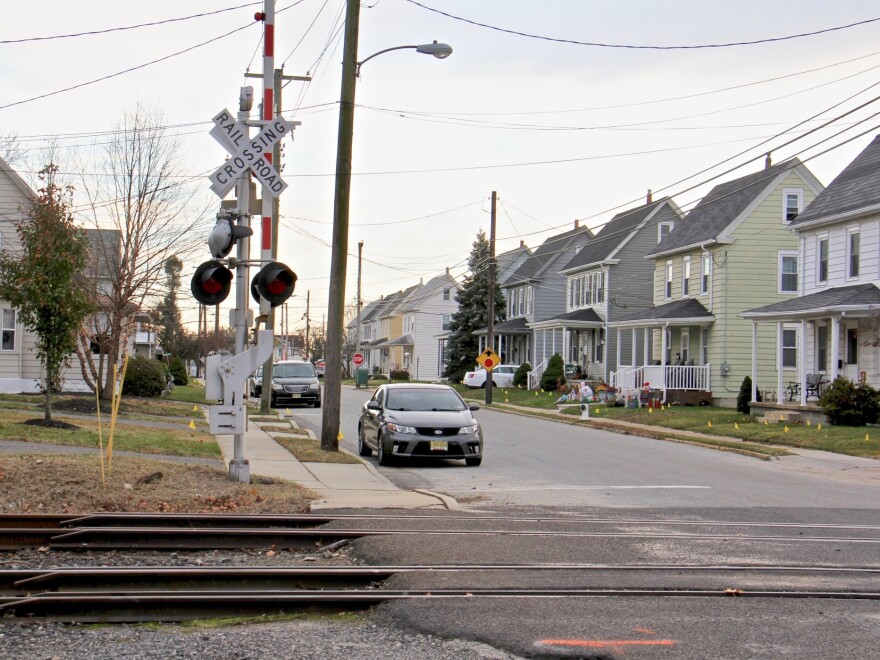In an effort to boost natural gas exports, the Trump administration has reversed longstanding federal policy and approved transport of gas by rail anywhere in the country. Opposition has come from Hollywood stars, state attorneys general and local residents who worry about the danger this poses. But plans are moving ahead for a New Jersey project that calls for one of the longest such transport routes in the country: 200 miles through densely populated areas of the East Coast.
Thegas from Pennsylvania's Marcellus Shale would first be sent by pipeline to a new liquefaction plant in the rural northeast part of the state. Refrigeration units would chill it to negative-260 degrees Fahrenheit, at which point it becomes liquid and easier to ship. The part of the plan that scares a lot of people is the next step — transporting the gas by truck or rail down the busy I-95 corridor to a planned export terminal along the Delaware River in Gloucester County, New Jersey.
"That terrifies me," says Vanessa Keegan, who lives nearby with her family, including her three-year-old son Theo. She points to where rail cars full of highly flammable liquefied natural gas — or LNG — would roll about a block and a half away from her house. "That train track that you could skip on down to in about a minute and a half."
A daycare center sits right next to the gate of the planned export terminal.
Pipelines are the more common way to move gas long distances, but battles over them have delayed or even scrapped some projects. Trucks are also allowed to transport LNG. But using rail cars in densely populated areas had been limited until the new rule took effect in August.
Even before that, Delaware River Partners, a subsidiary of New Fortress Energy, which has ties to President Trump, secured a special federal permit to move the LNG by rail. It allows two 100-car trains to transport the gas each day.

In this rust-belt region of New Jersey the project does have support, including from building trade unions and powerful state lawmakers. State Assemblyman John Burzichelli says his grandfather worked at a shuttered DuPont dynamite plant that will house the planned LNG export terminal.
"That site will create jobs as it once did, contribute to the tax base as it once did, and be an important economic driver for people to make a living and feed their families," says Burzichelli.
He says safety issues should be addressed, but that rail cars carry much more hazardous materials through the region every day. "The history of moving this stuff is pretty sound," he says.
The new rule does require rail cars to be built with a thicker outer tank than is mandated for other hazardous cryogenic liquids like ethylene and ethane. (Although it's unclear if that applies to projects like this one, greenlighted earlier through a special permit.)
Ray Mentzer, a chemical engineer at Purdue University, spent his career working on LNG projects for Exxon Mobil. He says the specially designed containers that transport hydrocarbons have a good safety record. But he says transporting the gas through densely populated areas increases the risk if there's a leak.
"It's not flammable until it's vaporized, but it's going to be vaporized pretty darn quickly and then it's going to seek an ignition source," he says. "Believe me, it will find an ignition source pretty darn readily."
The developers of the New Jersey export project — New Fortress Energy and Delaware River Partners — did not respond to multiple requests for an interview, and would not confirm details of their plans.
Rail companies lobbied for the rule and downplay the potential for accidents.
Earlier this year, Ian Jefferies, CEO of the Association of American Railroads, told NPR "the track record speaks for itself: 99.99% of all hazmat moved by rail reaches its destination without any incident whatsoever." He also said industry uses "risk-based routing analysis to ensure that railroads are using the lowest risk routes."
Fifteen state Attorneys General, including those in Pennsylvania, New Jersey and Delaware, have challenged the move saying it put people's lives at risk.
"We're going to court because our families expect our government to put their safety first, not put them in harm's way," said California Attorney General Xavier Becerra in a statement. Becerra is now president-elect Joe Biden's nominee for Health and Human Services Secretary.
Despite joining that suit, New Jersey recently signed off on construction of a dock for the LNG export project, although N.J. Governor Phil Murphy says the state "will explore all avenues within its authority to prevent the use of this dock for LNG transport."
The Delaware Riverkeeper Network has challenged a number of state and federal permits for the project, saying a thorough Environmental Impact Statement was never done.
"The Biden Administration could step in and set a policy that this project, and all other LNG export projects, require comprehensive environmental review," says the network's deputy director Tracy Carluccio.
Standing on her porch along the route to the planned export terminal, Vanessa Keegan worries that transporting LNG by rail is untested. "If an accident happens," she says, "we don't get to show up the next day and say, 'Look, I told you so.'"
She also thinks fossil fuel projects like this should be abandoned in favor of renewables like wind or solar.
In fact, if the export facility gets built, none of the gas traveling through the area will go to power New Jersey homes. The state is planning a large offshore wind farm to help reach its goal of using all clean energy by 2050.
Copyright 2021 WHYY. To see more, visit WHYY. 9(MDA5NTM4MTIyMDE0MTg3NDc2MTVlZjdmNQ001))





